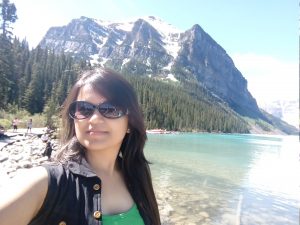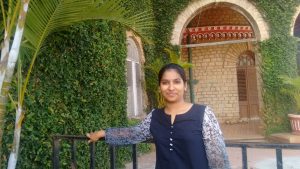Meet Radha Vishnamsethy – A final year student, pursuing 5 year Integrated M.Sc
Nanotechnology course at Acharya Nagarjuna University, Guntur (Andhra Pradesh). Apart from

being excellent in studies, she enjoys listening to soft music and surfing educational sites.Along with that she enjoys gardening and contributing her part in saving our planet.She was selected for Indian Academy of Sciences Summer Research Fellowship Programme-One of the most reputed internships in India. The internships being associated with three national academies of sciences, namely Indian Academy of Sciences (IAS), Indian National Science Academy (INSA) and National Academy of Sciences (NASI).The duration of her intern was of 8 weeks, at CSIR lab, CMERI Durgapur and the stipend shereceived was Rs.7000/- per month plus round trip train-fare from her institute to intern place.
So let’s know about her experiences…
InternFeel: How you came to know about the internship? Generally what was your way of beingin touch with the media to get the information about the various internships?
Radha: Actually one of my juniors was selected for this IAS fellowship programme in 2012. So, I applied for this year and got selected. I usually visited few general Internship websites like JobMonkey.com,Internships.About.com, Summerinternships.com, InternZoo.com, internships.com, CollegeWorks.com etc.
IF: How much competitive is the selection process? What things you feel are looked for in the applicantby the selectors?
Radha: There is a little bit tough competition for the selection. I felt that selectors were mainly considering the write-up part (Statement of Purpose or SOP) in the application form which has to be filled by the applicant in about 250 words of what he/she wants to learn and achieve. They don’t consider if it is copied from Internet. It should be prepared on your own by referring different journals, books, publications.
IF: What qualities of yours – educational / otherwise, you feel helped you in having an edge over the selection process?
Radha: As I have mentioned earlier, I think that I was selected due to my SOP (Statement of Purpose) and then also because of my good percentage of marks in 10th and 12th classes which was above 90%.
IF: Approximately when you got the news for the selection? How was the celebration?
Radha: I felt extremely happy on that day. Only 3 members were selected for IAS fellowship in our entire department. Every one including my faculty members congratulated us and mentioned our names on the notice board. But my parents were little bit worried because the place was too far from our hometown and also because of different local language.
IF: What all preparations you did before joining and after the results?
Radha: Before joining I had contacted my guide and discussed with him about my joining dates, accommodation and asked about my work. He had sent me the abstract of my project work and I studied about it before joining so that I could get an idea about my work which I will pursue there.
IF: Any common mistakes which you feel students should avoid while searching and applying for internships?
Radha: I would like to mention some of the common mistakes which I came to know.1. Students shouldn’t expect all internships to be paid. Although it is highly desirable to get a paid one, but they should also consider accepting both paid and non-paid internships, because sometimes even non-paid internships can be better.
2. They shouldn’t exceed the number of words required while filling the application. If they are asked to write a 250 words write-up, it must be within 250, not 250+. Selection panel tests their ability to communicate their thoughts with clarity and concision.
3. They shouldn’t copy or buy essays from the internet and refrain from plagiarizing essay. They should write their own essay. If they are copying essays from the internet then there are chances of another student doing the same. Getting caught is risky and not worth it.
4. They should ask a teacher or adviser to review their application before submission. Doing so will help eliminate the mistakes.
5. They should relate their write-up to themselves. Details written should be unique to them and that only they could have written.
IF: So Radha, could you please highlight us with what work/research project you carried out during the internship period? It’s application in near future and your work in it?
Radha: The title of the project was: Designing Multi Texture Superhydrophobic Surfaces By Selective Chemical Etching On Aluminum. Superhydrophobic surfaces are highly hydrophobic, i.e., extremely difficult to wet. The contact angles of a water droplet exceeds 150° and the roll-off angle/contact angle hysteresis is less than 10°. Wettability of a solid surface is an important property because controlling the surface wettability is crucial in many practical applications. A direct expression of the wettability of a surface is the contact angle (CA) of a water droplet on the surface.
In recent years, there has been much interest on these areas as these surfacesexhibitsuperior properties such as antisticking, anti-contamination, and self-cleaning. It is well-known that wettability of a solid surface is governed by two dominant factors, which are surface composition and surface roughness. Photograph of a water drop on Superhydrophobic aluminium sample which I had prepared is shown on the side. (Fig.1).In my project work I mainly focused on layer by layer texturing for preparation of superhydrophobic surfaces through combination of chemical etching and self-assembly. With a combination of chemical etching and self-assembly,roughness induced superhydrophobic surfaces were developed. In conclusion, the desired multitextured superhydrophobic surfaces were successfully developed with a water contact angle of ~ 160º which shows self-cleansing properties.
Radha: All my senior lab mates were very friendly and helpful. They used to explain me in very friendly manner whenever I had any doubts. And coming to my work, my guide planned my work in a perfect way. I never felt overburden with my work. Everything went in a structured and planned manner.
IF: What problems you or your friends faced, during the internship, which your juniors may be able to avoid? Any safety issues for girls, which generally all parents fear about? Food and accommodation?
Radha: I didn’t face any such problems except language problem, because I don’t know Bengali, I can understand Hindi, but couldn’t speak fluently in Hindi. I used to talk with every one only in English. But it couldn’t help outside the college, but it didn’t make any big problem because of my friends. I thought that I couldn’t find any Telugu people over there. But, surprisingly I got many Telugu friends for which I feel so happy.
Coming to food it was very difficult for me to have that food. Since I am a south Indian, I am unable to get used to that food while all others used to say that it was tasty, which surprised me a lot.And coming to accommodation, it was very pleasant and comfortable. Actually they were single bed-room flats, in each flat two members were allotted. The residence and mess was common for boys and girls
IF: As with almost everything, what were the cons of the internship? The elements which you felt, if wasn’t there could have made this internship super awesome?
Radha: I got a project which was not related to my subject but still I liked that work. So, I luckily became interested in working on that project. All my friends (almost all interns) left 2 weeks before I left. So, it became very difficult for me to stay during time but few friends (interns at CMERI) were from NIT Durgapur, we used to meet and have fun at weekends.









